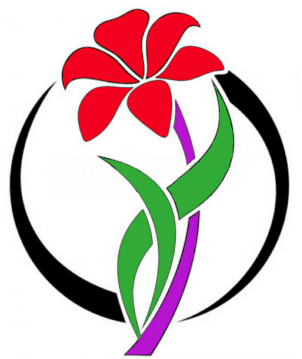Deep in Dixie, Supporters Rally Around the Confederate Flag
Uncommon Journalism speaks with several demonstrators, who claim the controversial symbol signifies not hate, but heritage.
 |
Deamon Strong, 24, waves a Confederate battle flag at a recent demonstration held in the suburbs of metro-Atlanta. (Photo Credit: James Swift)
|
By: James Swift
uncommonjournalism@gmail.com
@UNJournalism
CARTERSVILLE, Ga. -- Deamon Strong is a lone African-American, surrounded by two dozen Caucasians in the Deep South. Virtually all of the white men and women are carrying Confederate flags, and a few of them are even brandishing handguns at their hips.
Strong, 24, slowly walks towards a pick-up truck. There, he retrieves a homemade “rebel flag,” which appears to be a piece of fabric nailed to a wooden board.
He is soon swarmed by the crowd. He lifts up the flag and he begins waving it with gusto.
“I’m from Mississippi, and when I first came over here, the first thing I heard about the flag was that it was racist,” Strong said. “It ain’t racist … I’ve been doing a little history, and trying to tell people about it.”
The protest is the second in two days for Strong. The evening before, he participated in a “pride ride,” in which hundreds of Confederate flag supporters took to Highway 41 to fly their controversial emblem.
“It was for my friends and my family,” he said. “It’s a Southern thing … it’s family, heritage, all that.”
He said he has little patience for those who claim the flag represents prejudice and oppression. When others say the battle flag of the South symbolizes racism, Strong said he just bites his tongue and shrugs.
“I don’t respond,” he said. “They don’t know. They’re ignorant and I don’t talk to them.”
Taking it to the Pavement
On July 12, Strong and his fellow demonstrators parked their trucks at the local Walmart. The protest, taking place about 40 miles to the north of Atlanta, is becoming something of a weekly rite.
One demonstrator, 23-year-old Courtland Walters, said he once held his post for 13 hours straight.
“You cannot erase history, because if you do, we’re just going to be doomed to repeat it,” he said. “If you start ripping down everything, in the long-term future, you’re going to have a lot more problems.”
The demonstrations, he said, are peaceful. Unruly protesters are admonished, and all sorts of aggressive automotive behaviors -- cutting donuts and revving engines, namely -- are not tolerated. During downtime, he said the protesters pick up litter and lend their hands to those needing help with flat tires.
Waving Confederate flags, the former state flag of Georgia and Old Glory, the protesters wait for motorists to cruise by a narrow sliver of roadway, wedged between a strip mall and a hospital overflow parking lot.
Some honk their horns and give them a thumbs up gesture of appreciation. Others are less enthusiastic about the display -- one protester said a passing motorist asked her if she could borrow her flag for use as toilet paper.
Tensions that afternoon were high. Some demonstrators were concerned by a man who had parked his car near a filling station and gave them some menacing looks. Alas, there were no confrontations that evening, other than the demonstrators’ battle against the nearly triple-digit heat.
Cierra Frederick, 23, said Walmart was chosen as a protest site because of the company’s decision to discontinue selling items portraying the Confederate flag.
“They were melting down class rings that had the Confederate flag on them,” she said, “and refusing to sell them to people who had already paid for them.”
Walmart is not the only major retailer to suspend sells of rebel flag-emblazoned products in the wake of the June 17 Emanuel African Methodist Episcopal Church mass shooting in Charleston, S.C. Shortly after the massacre that left nine people dead, online merchants eBay and Amazon both purged the “Stars and Bars” from their inventories.
“You can still by an ISIS flag or a Nazi flag,” said 44-year-old demonstrator Cory Williams. “They didn’t remove all of that stuff, just our heritage.”
What Does the Confederate Flag Symbolize?
 In the wake of the Charleston shooting -- perpetrated by a killer who photographed himself waving the rebel flag -- numerous groups rallied for the emblem’s removal from public property.
In the wake of the Charleston shooting -- perpetrated by a killer who photographed himself waving the rebel flag -- numerous groups rallied for the emblem’s removal from public property.Two days after the massacre, National Association for the Advancement of Colored People (NAACP) President Cornell Brooks urged South Carolina legislators to remove the flag from a Civil War memorial on the grounds of the State House.
“When we see that symbol lifted up as an emblem of hate, as a tool of hate, as an inspiration for hate, as an inspiration for violence,” he is quoted by NPR, “that symbol has to come down.”
On July 10, the flag was removed in a ceremony that drew approximately 10,000 attendees. Moments later, President Barack Obama took to Twitter, calling the event “a signal of good will and healing and a meaningful step towards a better future.”
Similar symbolic acts are taking place throughout the southeastern United States.
Three days before the flag came down in Charleston the Memphis City Council voted unanimously to exhume the remains of Confederate general and Klansman Nathan Bedford Forrest from a public park. In Atlanta, the head of the local NAACP chapter has called for the removal of all Confederate iconography from Stone Mountain Park, including an engraving featuring a trio of CSA leaders.
“They can be sand-blasted off or somebody could carefully remove a slab of that and auction it off to the highest bidder,” he told a local news station. “My tax dollars should not be used to commemorate slavery.”
The Walmart protesters in Cartersville, however, say the flag means something entirely different.
One demonstrator, a 23-year-old man named Robert, said the emblem represents freedom and means as much to him as the American flag.
“I’m not only here for the South, I’m here to share my beliefs,” he said. “This is what we know, this is how we know and this is basically all we know … it’s just God and country.”
Frederick said the flag represents a brotherhood shared by all southerners, regardless of race.
“When it comes down to something, we are all going to stand together," she said. “It’s our heritage.”
The rebel flag iconography, Williams said, has been hijacked by white supremacists. One of the reasons he is protesting, he said, is to “reclaim” the emblem from hate groups.
“There are historical locations it needs to fly in to represent things that have happened in the past,” he said. “People think we’re racist and we stand for a bad cause … we just want it to be recognized as our heritage, something that we live everyday.”
Race Relations in the Modern South
A majority of the protesters said local race relations have taken a hit in the recent weeks.
“The news media has turned this into something it shouldn’t have ever been,” Williams said. “It was almost dead, then all of a sudden, somebody in the White House says ‘racism’ and it’s alive again … it breaks my heart.”
Walters echoed the sentiment. “Racism was almost dead,” he said. “Somebody could walk up to you and say, ‘hey I like your shirt because I think that flag is cool.’ All of a sudden, now they are coming out and saying it’s racist, and everybody’s trying to throw stuff at us.”
He said he takes great offense to those who deem him a “bigot” because he flies the rebel flag.
“I don’t like the feeling that just because I’m Southern, I’m an automatic racist,” he said. “I want to be able to step out and just say, ‘hey, I like my flag, but I like some of the stuff you like, too -- I like lowered cars, I like going out and clubbing.”
Within the contemporary southern culture, he said the color lines blur. He and his friends may drive
huge, fuel-chugging trucks, but inside the cabin, he said they’re blasting rap music.
“Maybe our trucks are higher than yours, but our hearts are the same,” he said. “How are you going to tell me the difference between a black person’s pint of blood and a white person’s pint of blood? You can’t … we’re all the same on the inside, it’s just a different skin color.”
While he’s encountered a few people claiming affiliation with groups such as the Ku Klux Klan on “pride rides,” he said he does not share their worldviews.
“You’re going to have a few bad apples,” he said. “The KKK, you can tell them to go jump off a cliff … we have no respect for any supremacists, whatsoever.”
 Walters said he does not understand why so many view Confederate flag proponents as pariahs, especially considering their laissez-faire approach when it comes to other social issues, such as gay marriage.
Walters said he does not understand why so many view Confederate flag proponents as pariahs, especially considering their laissez-faire approach when it comes to other social issues, such as gay marriage.“We were the ones saying, ‘yeah, you can do whatever you want, we’re not going to stop you,” he said. “The whole world has turned on us … we have helped out everybody and now we’re getting the short-end of the stick.”
What’s really dividing the South along color lines isn’t the flag, Walters said. Instead, he said he believes it is perpetual media coverage and political rhetoric pitting African-Americans and Caucasians against one another.
“It was going great, everybody got along and we could all hang out together,” he said. “You cannot go on TV and tell everybody it's about race and expect it to be OK.”
The crusade against Confederate imagery has reached absurd heights, Williams said. He cites the recent “cancellation” of the 1980s program “The Dukes of Hazzard” on the cable television station TV Land, due to the show’s protagonists driving a car adorned with the rebel flag.
“That’s a wholesome show, where they do nothing but help people,” he said. “Even Uncle Jesse himself says ‘don’t give into prejudices, you were raised better than that.’”
He said he shares close relationships with many black friends, among them fellow demonstrator Strong. They may not be the same color, Williams said, but he considers them to be brothers all the same.
“Family ain’t just blood, that’s our motto,” he said. “God made every one of us, and as long as you are with God and every man beside you is your brother, you’ll have a better world.”
Still, Williams said he is deeply concerned by growing tensions between the white and black community.
“I just hope America gets a grip and we get it under control,” he said, “before we are all being controlled.”
Uncommon Journalism, 2015



This comment has been removed by the author.
ReplyDeleteWould love a copy of the whole picture if possible. Great article! Thank you!
ReplyDeleteLivelifefull14@gmail.com is my email if you would like to send it to me.
ReplyDelete